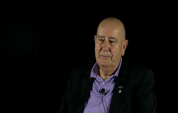3:41 | The officers and their wives were a close knit group, having lived and trained together. Bob Babcock was grateful for that and he was grateful for Sergeant Frank Roath, who told him, "There is a reason they call me a senior NCO and you a junior officer." He was also grateful that when they were operating in Vietnam, there were no racial issues, thanks to good soldiers like Willie Cheatham.

After attending the "Benning school for boys," Bob Babcock joined the 4th Infantry Division and headed for Vietnam. His first impression? "It's hot and it stinks." They arrived locked and loaded, but were surprised to see Americans walking around taking it easy. Then the rain started.
The base camp started as a forest area and was transformed into a prairie by the Americans and Montagnards who cut down the trees for a field of fire. The green soldiers sent out the first patrol and nothing happened but they returned as conquering heroes. Bob Babcock blocked another kind of action on his part of the perimeter when a group of ladies pulled up on scooters.
As his unit began operations in Vietnam, Bob Babcock encountered the soldiers of the Korean White Horse Division. They were much more hard-nosed and disciplined than any other unit there, and when one of their men ran afoul of the law, they took him out and shot him. When Babcock's outfit suffered their first KIA, Albert Collins, it set off a ridiculous chain of events regarding the naming of the base camp.
They were all green. No one in Bob Babcock's unit had been in Vietnam before. As they hunkered down for the night in the jungle, all of a sudden, an obscene insult rang out, then another. They called in artillery and blasted the jungle around them. Who was taunting them? One thing was for sure, Babcock was going to trust the instincts of his K9 at the point.
Bob Babcock's most vivid memory of Vietnam is the time his unit was hit by friendly fire. A tree burst rained down shrapnel and radioman David Mendez was killed. Sgt. Roy Reynolds and Lt. Walt Ferguson were also wounded and the men had to chop down trees to give the evacuation choppers room to land.
A cheer went up when the plane full of returning soldiers left Vietnam and headed out over the ocean. Bob Babcock recalls how tough it was writing the family of David Hubbard, who's body was mangled by a direct hit. When he got home, where his Mom and wife had written nearly every day, other people were strangely distant and apathetic about the war.
Comfortably back at home, Bob Babcock nearly rejoined the fight when the Tet offensive made the headlines shortly after his return. After he decided against it, he became active with veterans groups, and began a career at IBM, where he says his decisions were not nearly as important as the ones he made in the jungle as a 23 year old Lieutenant.
Never blame the soldier. That's the lesson to be learned from the Vietnam War and it's political aftermath, says Bob Babcock. He also says that leadership in Washington was and is sorely lacking and that we could have won that war had it been fought correctly. Finally, he reflects on his experiences at the Vietnam Veterans Memorial.